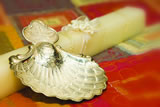by Dr. Jerald C. Joersz
I once witnessed a Lutheran pastor baptizing a person by immersion. I didn’t know we Lutherans baptized that way. Is this a proper way to baptize?
 Lutherans have understood the Bible to teach that a valid Baptism must include the application of water (together with the Word), but the manner in which the water is applied is not a matter of divine command. Lutherans have objected to the practice of immersion when someone insists or the impression is given that this form is required by God for a Baptism to be valid or proper.
Lutherans have understood the Bible to teach that a valid Baptism must include the application of water (together with the Word), but the manner in which the water is applied is not a matter of divine command. Lutherans have objected to the practice of immersion when someone insists or the impression is given that this form is required by God for a Baptism to be valid or proper.
Martin Luther consistently taught that only “the water and the Word constitute one baptism” (Large Catechism IV, 46), not the way water is applied. In his day, baptismal practices varied. In some churches it was customary for the pastor to pour water from the baptismal font over the infant’s head. Others immersed an infant three times in the baptismal font. Luther expressed a personal preference for this latter practice because of its symbolic significance. In a treatise on the Sacrament of Baptism (1519), he wrote that such a usage reminds us that “baptism . . . signifies that the old man and sinful birth of flesh and blood are to be wholly drowned by the grace of God” (Luther’s Works, 35:29).
Christians today who require immersion usually argue that only this method is faithful to God’s will. They commonly insist that the Greek term for “baptize” (the verb baptizo, as well as its noun form) has the root meaning “immerse.” Thus, they contend, Baptism must be by immersion. However, this cannot be proven on the basis of the New Testament.
To be precise, the word cannot be reduced merely to this narrow definition. In some contexts the term belongs in the category of “cleanse or purify” by washing (e.g., Mark 7:4) and not necessarily by immersion. One Greek dictionary widely used by translators today gives examples of acceptable ways to translate the term and then says: “such expressions do not necessarily imply the quantity of water nor the particular means by which the water is applied.”
How good it is to know that the value and effect of our Baptism does not depend on the quantity of water our pastor used or the way he applied it! And we most certainly do not need to be rebaptized for such reasons. “Even if we were immersed in water a hundred times,” says Luther, “it would nevertheless not be more that one baptism, and the effect and significance would continue and remain” (Large Catechism IV, 78). Through God’s work (not ours) of Holy Baptism, He “offers and presents the forgiveness of sins,” life, and salvation to us according to His promise. Each day through daily contrition and repentance we make use of our Baptism. In this way, the Old Adam within us “with all sins and evil desires” daily should be drowned and die, and “a new man daily emerge and arise to live before God in righteousness and purity forever” (Small Catechism, “What Baptism Indicates,” 22–23, 210–11).
—
About the Author: Until his retirement, Dr. Jerald C. Joersz was an associate executive director of the LCMS Commission on Theology and Church Relations.
Send your questions to “Q&A,” c/o The Lutheran Witness, 1333 S. Kirkwood Road, St. Louis, MO 63122-7295. Please include your name and address. All questions will be considered, but none can be answered individually.
October 2010






LUTHERANS AND PRESBYTERIANS DONT NEED TO BE IMMERSED
This is very insightful, eps since it was of the only articles I could find addressing this particular sensitive subject, but it begs the question, if we are to follow the example of Christ, and he was baptized by immersion, why wouldn’t that be something we imitate for our own baptisms? I’d love to dig a little deeper into this bc it’s the only thing I can’t get on board with as far as Lutheran doctrine goes.
We cannot say Jesus was immersed at His Baptism by John; for one, Scripture doesn’t indicate such, and even to this day the Jordan River is normally rather shallow, knee high at best – the tourist industry has a backhoe hollow out a section each season deep enough so its customers may have their “full immersion” experience (for a modest fee, of course).